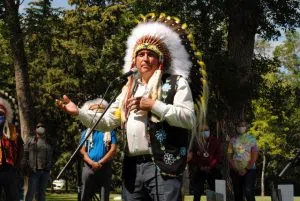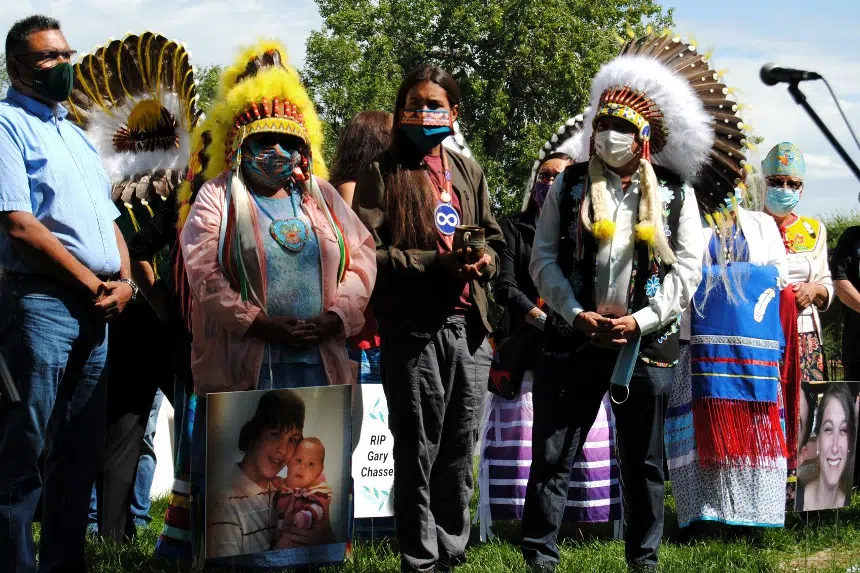Where there are normally only a few people here and there in the protest camp across from the legislature, on Tuesday dozens of chiefs wearing facemasks along with their headdresses stood behind Tristen Durocher, both literally and figuratively.
Chiefs from across the province came together to show their support for Durocher and his cause. He was on the 12th day of a hunger strike after walking to Regina from northern Saskatchewan, all to raise awareness of the high suicide rates in the province and to push the provincial government to do more.
The chiefs praised Durocher.
“We heard the message from Tristen, his story, his survival, and what he is going to do for the next 30 days,” said Chief Mary-Anne Day Walker Pelletier of the Okanese First Nation.
“He is not doing this to be a movie star — I talked to him this morning — he’s doing this to save lives, save our kids’ lives. And he’s doing this to make change, (to tell) that government sitting over there that they need to reinvest and put funding to our cause.”
Dr. Tammy Cook-Searson, chief of the Lac La Ronge Indian Band, talked about Durocher’s drive and determination on the 600-plus-kilometre walk to get to the legislative building.
“We had some heat waves, windstorms, rain, mosquitoes, all kinds of weather — he weathered the storm to be here. And he continues to weather the storm to be here for 44 days,” she said.
Durocher announced on Facebook earlier in the week that his fast will end Sept. 13, 44 days after he started — one day for every MLA who voted against the suicide prevention bill that was defeated in June.
Assembly of First Nations National Chief Perry Bellegarde was in the crowd, and he talked about this problem affecting Saskatchewan, but also all First Nations in the country.

Perry Bellegarde, the National Chief of the Assembly of First Nations, spoke of the need for a national strategy on suicide prevention at the protest camp in Wascana Park on Aug. 11, 2020. (Lisa Schick/980 CJME)
“You need to provide hope and Tristen, that’s what you’re doing; you’re providing hope. And it’s up to us now as the Assembly of First Nations and FSIN and tribal council and treaty areas to put pressure on the decision-making peoples in this house here,” he said, pointing to the legislative building, “and in that house in Ottawa, so legislation (is put) in place to adequately deal with this crisis, to provide hope.”
Chiefs and members of their bands also came to share the struggles their communities are having with suicide and to lay their pain on the front lawn of the legislature.
Chief Margaret Bear of the Ochapowace First Nation said they’ve been experiencing great loss.
“In the past two weeks we had an attempt to suicide, one of our young men. It was his partner that put him down and revived him. Today he’s in the hospital and we pray for him, we know that he’s going to be well. But that’s something we are living with in our communities,” said Bear.
Most of the chiefs spoke about their own experiences with suicide, the friends and family they know who’d been lost and the pain they’d felt.
Fond du Lac Denesuline First Nation Chief Louie Mercredi came to the park with a large group of people from his area. They stood with him as he addressed the crowd, several holding pictures of loved ones they’d lost.
Mercredi said he’d lost many to suicide, including two brothers-in law, a nephew and his daughter’s boyfriend. He said just that morning another body had been recovered in their community.
“I as a chief carry a lot of burden for my people. We’re dealing with the COVID-19 pandemic, we’re dealing with a suicide pandemic (and) we’re also faced with an alcohol pandemic,” said Mercredi, his voice taut with emotion.
A man named Victor was with the group and he spoke about losing his son to suicide just a few years ago. He spoke through sobs, explaining that after one son was killed, the family moved to Saskatoon, and a few years later his other son got depressed.
“ ‘It’s hard, Dad,’ he told me. ‘It’s so hard,’ ” Victor said.
Victor said the government needs to make changes up north.
“See the young people here, we need to have a future for them, not bury them in our lives,” he said.
Mercredi said it has been 40 years since his First Nation had its first suicide and now it has lost so many loved ones that the young people in the community think it’s normal. He said they don’t have the tools or the funds to save their people, and asked for help.
FSIN Chief Bobby Cameron said the $2.5 million from the province was a good start, but it was only a small amount and this problem needs a greater investment.
Cameron said the province’s suicide strategy won’t work because it doesn’t have direction or recommendations from First Nations people.
“So what we’re going to do is work with folks like Tristen and many, many others who are affected and hand them a bill based on our recommendations, our protocols, our traditions and language and culture,” said Cameron.
Cameron said everyone talks about reconciliation and partnership, and this bill will be built and developed from their people.











